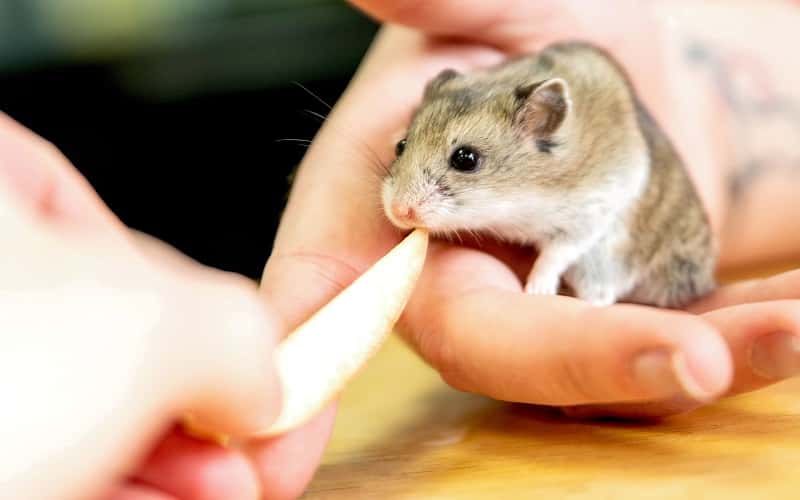Can Hamsters Consume Apples? You're wondering if hamsters can eat apples. Discover the answer in our article! Here are the best tips for your furry friend!
Apple's Mysteries
Apples, with their crisp texture and juicy sweetness, have long been a human favorite. But what about our little hamster pals? In this detailed blog post, we'll answer the question "Can hamsters eat apples?" and look at the benefits and drawbacks of including this fruit in their diet.
What Is the Composition of Apples?
Apples, nature's gift, are made up of delectable flesh encased in a thin skin. Apples, which are members of the Rosaceae family, come in a wide range of colors, flavors, and varieties. What matters most is whether they are appropriate and safe for your hamster.
Apple Nutritional Composition
While apples are not a primary food source for hamsters, they do contain essential nutrients that can benefit their health:
Fiber: Helps with digestion and gut function.
Vitamins: These include vitamin C and a variety of B vitamins.
Minerals include potassium and trace amounts of calcium.
Why Are Apples Safe for Hamsters?
Because of their natural sweetness and fiber content, apples make an excellent hamster treat. The fiber in apples aids digestion, and the vitamins and minerals improve overall health. However, keep in mind that apples should only be a minor and infrequent part of your hamster's diet.
The Advantages of Feeding Apples to Hamsters
Uncovering the Benefits Incorporating apples into your hamster's diet in moderation may provide several benefits:
Digestive Health: The fiber in apples aids in the maintenance of a healthy digestive system and the prevention of constipation.
Vitamins and antioxidants: Apples contain vitamins that help your hamster's immune system and overall health.
Enrichment: Introducing new foods, such as apples, can provide your hamster with mental stimulation.
Exemplifying Health Advantages
The vitamin C in apples can help your hamster's immune system, while the fiber helps regulate digestion, lowering the risk of gastrointestinal issues.
Apples Contain Nutrients
Apples contain a variety of nutrients that can benefit your hamster's health, including vitamin C, vitamin A, potassium, and dietary fiber. These nutrients work together to improve your hamster's vitality and overall health.
The Dangers of Feeding Apples to Hamsters
Taking Precaution Though apples are generally safe for hamsters, there are a few risks to be aware of:
Pesticides: If apples aren't organic, their skin may contain toxic pesticides. To keep your pet safe, always choose organic apples.
Natural sugars in apples can cause weight gain and blood sugar fluctuations if consumed in excess.
Compositions to Avoid
Apple seeds contain trace amounts of cyanide, which can be dangerous in large quantities. Always remove the seeds and core from apples before giving them to your hamster for safety.
Overconsumption's Consequences
Excessive apple consumption in your hamster can result in health issues. Too much sugar from apples can cause weight gain, dental problems, and digestive problems.
Recognizing Apple Poisoning Symptoms in Hamsters
Possible Indicators If your hamster eats a lot of apples, keep an eye out for the following symptoms:
Diarrhea, bloating, or changes in stool consistency are all symptoms of digestive distress.
Lethargy: Your hamster may appear drowsy or less active than usual.
Cases of Apple Poisoning In rare cases, hamsters may suffer from digestive upset or diarrhea after consuming an excessive amount of apple flesh. Observing your hamster's reaction to apples will allow you to adjust portion sizes as needed.
Choosing an Appropriate Number of Apples
Moderation is essential.
Moderation is essential when it comes to apples. As an occasional treat, serve a small slice or cube. Limit apple treats to 1 to 2 times per week, and keep them to no more than 10% of your hamster's overall diet.
Dietary Guidelines for a Healthy Lifestyle
A well-balanced hamster diet includes a variety of fresh vegetables, high-quality hamster pellets, occasional fruits such as apples, and appropriate treats. This method ensures that your hamster receives a wide variety of nutrients.
Investigating Alternatives and Supplemental Foods
Dietary Variety Hamsters can eat a variety of foods in addition to apples, including:
Leafy greens such as spinach, kale, and parsley are high in vitamins and minerals.
Blueberries, pears, and strawberries are high in natural sugars and antioxidants.
Carrots, bell peppers, and cucumber are all crunchy and nutritious vegetables.
Famous Hamster Foods
Aside from fruits and vegetables, hamsters thrive on commercially available hamster pellets that contain essential nutrients. On occasion, treats like pumpkin seeds and small portions of unseasoned cooked meat can be included.


إرسال تعليق